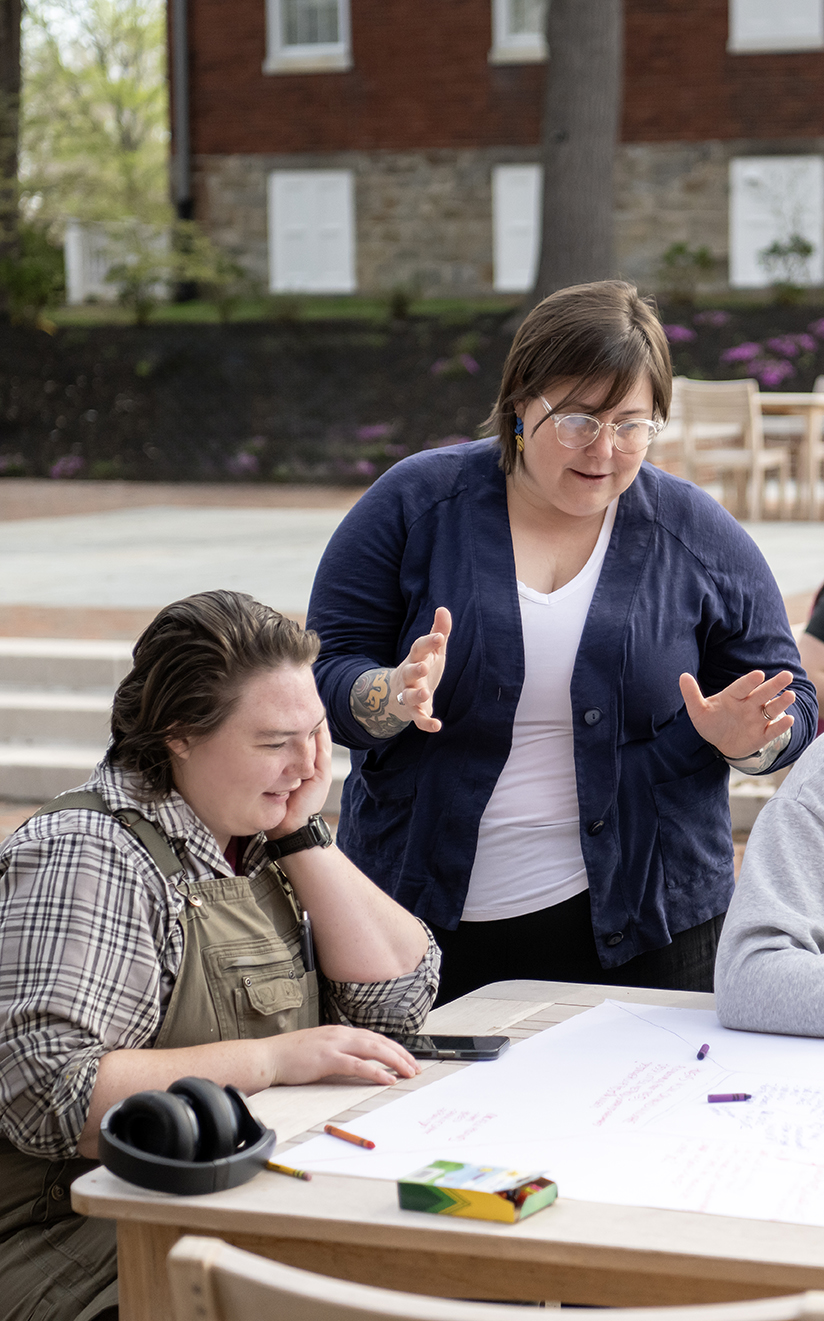

An Authentic Vision
Sara Clarke-De Reza
Department of Education
What she learned firsthand at that school led her to draw some conclusions: authentic
experiences have dramatic educational and developmental value for students, and children
are often more capable than adults expect. Both were especially true when children
were given multiple and different settings in which to grow. For example, students
who led nature hikes or worked in a woodshop, in addition to spending time in the
classroom and writing essays, often thrived.
In graduate school, Clarke-De Reza wanted to develop and further expand upon these insights. While working on her doctorate, she taught educational psychology classes to master's degree students preparing to become K-12 teachers. The courses focused on how children learn and how the way people learn changes over their lifetime, and she incorporated elements of what she had learned at the residential school into these lessons. True to her conviction that authentic experience was a valuable learning tool, Clarke-De Reza partnered with a local children's museum so her student teachers would not only read about experiential learning methods but also apply them in a real setting.
Her student teachers observed kids at the museum and how they interacted with the installations and displays. Then, they co-created and taught a special Earth Day event with museum staff to experience their lessons.
“In spaces like museums, where play and self-initiative are at the fore, my students started to understand kids were capable of doing more than they had ever thought that those kids could do,” Clarke-De Reza said. “And I got really curious about how teachers use museums to extend what they're capable of doing in the classroom. That became my dissertation research. It has evolved and has become lots of different things at Washington College.”
Clarke-De Reza has indeed assembled an eclectic portfolio of projects and initiatives at Washington College. In addition to leading the Department of Education, she oversees the Libby & Douglass Cater Society of Junior Fellows and the museum, field, and community education minor. If that wasn't enough, outside of her leadership roles, Clarke-De Reza contributes to project after project: the Busload of Books Research Project, Chesapeake Semester, the Digital Scholarship in Museum Partnerships project, the developing makerspace and entrepreneurship center, the new museum the College runs on Cross Street, and the list goes on.
Varied as they may be, the projects she supports with her skills and through involving her students share an authentic connection to the world outside of the classroom and a focus on leveraging diverse expertise to have the greatest impact on students and the community.
“It's pretty well established in the research that experiential education—research with professors, fieldwork experiences, internships—those are some of the highest impact practices we can offer students. What makes them matter beyond the level of the individual is that extra layer of community collaboration and buy-in and partnership with people outside of the College,” Clarke-De Reza said. “Bringing together people with different sets of expertise to build something that none of them could build on their own and creating spaces where different kinds of expertise are valued is at the heart of all the things that I've done.”
Clarke-De Reza and many other faculty and staff members are finding different ways to bring people together to create and innovate. This has become increasingly important as Washington College deepens its commitment to civic and community engagement. These initiatives serve the dual purposes of preparing students to be citizen leaders of tomorrow while having a positive impact on society today.
The planning process for the donated Dixon Valve property at 800 High Street is a good practical example of how the classroom and the community can work together. The College wanted to do something with the space that would benefit both the Washington and the local communities. This is where Clarke-De Reza came in.
With Caddie Putnam Rankin, chair of the business department, and Pat Nugent, the Thomas V. Mike Miller Director of Civic Engagement, she taught a course that trained students in interviewing, surveying, and other community-engaged research methods. The students then applied their newfound skills to study what local community members and Washington staff and students wanted from a makerspace and entrepreneurship center on the Dixson site. The results have informed planning for the site.
That course was modeled after another that Clarke-De Reza had pioneered with Meghan Grosse, chair of the communications and media studies department. That qualitative research methods course has proved useful and applicable for students in any social science and is built around a real research project. For the first two times it has been offered, the students' project was evaluating Washington students' understanding and perception of College civic engagement efforts, with the goal of identifying ways to improve those efforts.
“What made it authentic as opposed to just an exercise in methods was that we were asking questions that Washington College really has. In the last couple of years, we have made a serious investment or reinvestment in civic engagement. And the students really cherish the opportunity to speak back to the institution. It appeals to their sense of justice and their desire to make the place they love a better place,” Clarke-De Reza said. “Authentic experience is the most important part of student learning. These things work because they are real, and they feel real to students because they actually have a real impact on and with the community.”
— Mark Jolly-Van Bodegraven